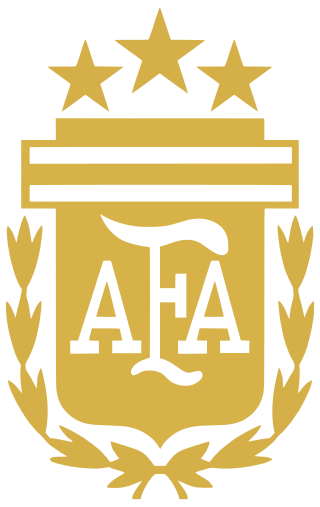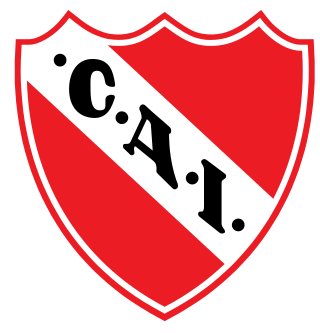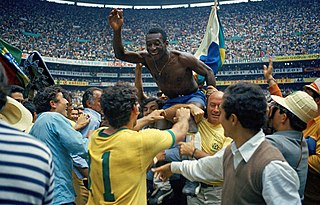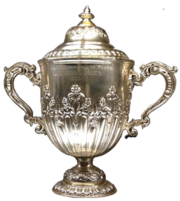
The 1950 FIFA World Cup was the fourth edition of the FIFA World Cup, the quadrennial international football championship for senior men's national teams and held in Brazil from 24 June to 16 July 1950. The planned 1942 and 1946 World Cups were cancelled due to World War II. This tournament ended the hiatus. Uruguay, who had won the inaugural competition in 1930, defeated the host nation, Brazil, in the deciding match of the four-team group of the final round. This was the only tournament not decided by a one-match final. It was also the inaugural tournament where the trophy was referred to as the Jules Rimet Cup, to mark the 25th anniversary of Jules Rimet's presidency of FIFA.

The Brazil national football team, nicknamed Seleção Canarinho, represents Brazil in men's international football and is administered by the Brazilian Football Confederation (CBF), the governing body for football in Brazil. They have been a member of FIFA since 1923 and a member of CONMEBOL since 1916.

The 1974 FIFA World Cup was the tenth FIFA World Cup, a quadrennial football tournament for men's senior national teams, and was played in West Germany between 13 June and 7 July. The tournament marked the first time that the current trophy, the FIFA World Cup Trophy, created by the Italian sculptor Silvio Gazzaniga, was awarded. The previous trophy, the Jules Rimet Trophy, had been won for the third time by Brazil in 1970 and awarded permanently to the Brazilians. This was the first out of three World Cups to feature two rounds of group stages.
The Copa América or CONMEBOL Copa América, known until 1975 as the South American Football Championship, is the top men's football tournament contested among national teams from South America. It is the oldest still-running continental football competition, as well as the third most watched in the world. The competition determines the champions of South America. Since the 1990s, teams from North America and Asia have also been invited to compete.

The CONMEBOL Libertadores, also known as the Copa Libertadores de América, is an annual international club football competition organized by CONMEBOL since 1960. It is the highest level of competition in South American club football. The tournament is named after the Libertadores, the leaders of the Latin American wars of independence, so a literal translation of its former name into English is "America's Liberators Cup".

The Argentina national football team represents Argentina in men's international football and is administered by the Argentine Football Association, the governing body for football in Argentina.
The Supercopa de España or the Spanish Super Cup is a super cup tournament in Spanish football. Founded in 1982 as a two-team competition, the current version has been contested since 2019–20 by four teams: the winners and runners-up of the Copa del Rey and La Liga. Real Madrid are the most recent winners.

Club Atlético Independiente is an Argentine professional sports club, which has its headquarters and stadium in the city of Avellaneda in Greater Buenos Aires. The club is best known for its football team, which plays in the Primera División and is considered one of Argentina's Big Five football clubs.

The CONMEBOL Recopa Sudamericana, known also as the Recopa Sudamericana or CONMEBOL Recopa, and simply as the Recopa, is an annual international club football competition organized by CONMEBOL since 1988. It is a match-up between the champions of the previous year's Copa Libertadores and the Copa Sudamericana, South America's premier club competitions.

The Copa Interamericana was an annual club football competition contested between a representative from North America (CONCACAF) and South America (CONMEBOL). Established in 1969, it was discontinued in 1998 after CONCACAF clubs, particularly those from Mexico, began participating in CONMEBOL competitions.

The Brazil-Argentina football rivalry is a sports rivalry between the national football teams of the two countries and their respective sets of fans. Games between the two teams, even those that are only friendly matches, are often marked by notable and controversial incidents. The rivalry has also been referred to as the "Battle of the Americas." FIFA has described it as the "essence of football rivalry". CNN ranked it second on their top 10 list of international football rivalries—only below the older England–Scotland football rivalry.
The 1960 Copa de Campeones de América was the first season of the Copa CONMEBOL Libertadores, CONMEBOL's premier club tournament. Seven association's clubs entered the first competition, with three not sending a representative. The first match of the tournament was played between Uruguayan side Peñarol and Bolivian side Jorge Wilstermann on April 19 in Montevideo, Uruguay.
The FIFA World Cup was first held in 1930, when FIFA, the world's football governing body, decided to stage an international men's football tournament under the era of FIFA president Jules Rimet who put this idea into place. The inaugural edition, held in 1930, was contested as a final tournament of only thirteen teams invited by the organization. Since then, the World Cup has experienced successive expansions and format remodeling, with its current 32-team final tournament preceded by a two-year qualifying process, involving over 200 teams from around the world.

This article summarizes the results and overall performance of Brazil at the FIFA World Cup, including the qualification phase and the final phase, officially called the World Cup finals. The qualification phase, which currently takes place over the three years preceding the finals, is used to determine which teams qualify for the finals. The current format of the finals involves 32 teams competing for the title, at venues within the host nation over a period of about a month. The World Cup Final is the most widely viewed sporting event in the world, with an estimated over 1 billion people watching the 2014 tournament final.
This is a list of the Brazil national football team's competitive records and statistics.
The Superclassic of the Americas, is an annual friendly football match between the national teams of Argentina and Brazil.
The history of the Argentina national football team begins with their first official match, played on 20 July 1902 against Uruguay, a 6–0 win in Paso del Molino, Montevideo. One year before, There had been a precedent when representatives from both sides met in a match also in Montevideo, although it was not organised by any association and therefore is not considered official.

The Brazil–Uruguay football rivalry, also known as El Clásico del Río Negro, or Clássico do Rio Negro, is a highly competitive sports rivalry between the Brazilian and Uruguayan national football teams, and their respective set of fans. Association football is the most popular sport in both countries and they have a combined 7 FIFA World Cups and 24 Copa Américas between them. Both countries also have a very close proximity and border each other, Uruguay only has a population of 3.5 million and has a size of 176,215 km2, while Brazil has a population of 210 million and a size of 8,515,767 km2, making it the 5th largest country in terms of both population and size.

Boca Juniors is an Argentine professional football club based in Buenos Aires. The club first participated in a South American competition in 1919. The first international cup they took part in was the Copa Aldao in which they participated as champions of Argentina. The club competed in AFA/AUF cups from 1919 to 1946 and since entering the Copa Libertadores, in 1963, the club has competed in every CONMEBOL-organized competition, except the Copa CONMEBOL, Intercontinental Champions' Supercup, Suruga Bank Championship, Copa Merconorte, Copa Master de CONMEBOL and Copa Ganadores de Copa, most of them are extinct.















